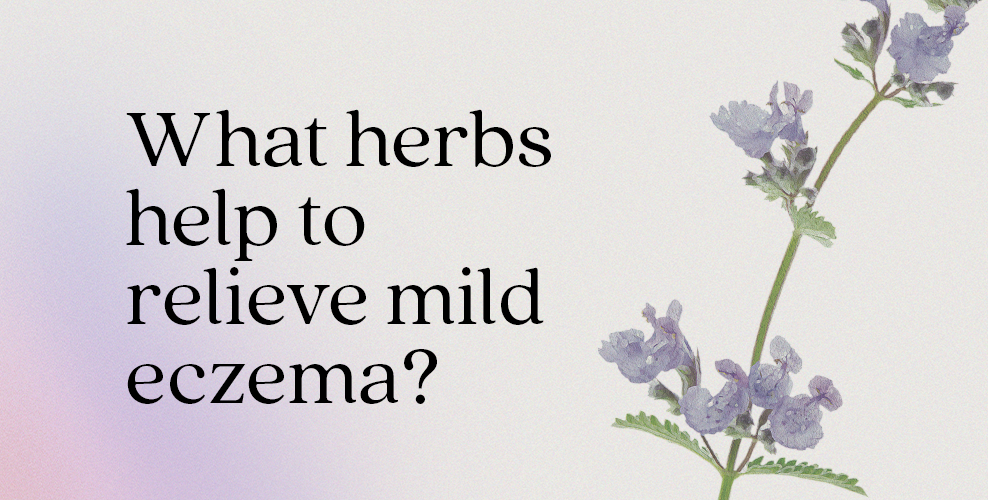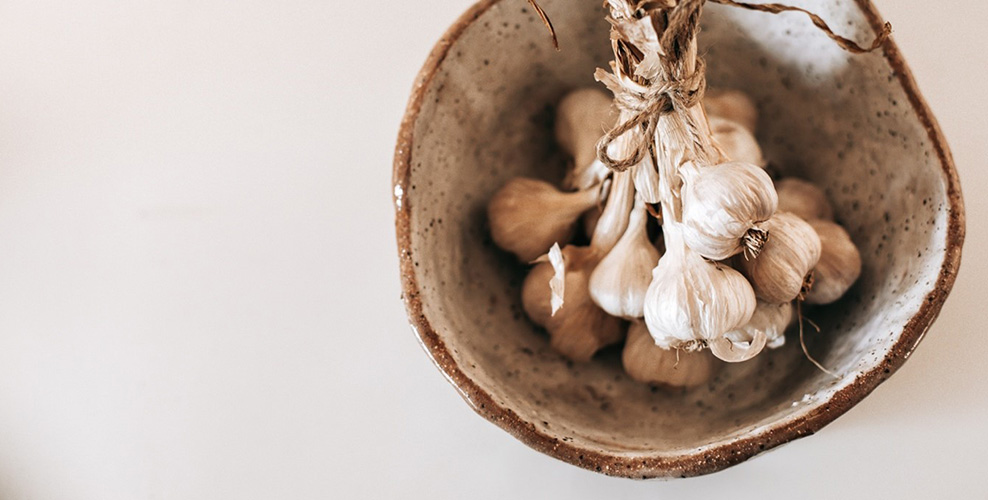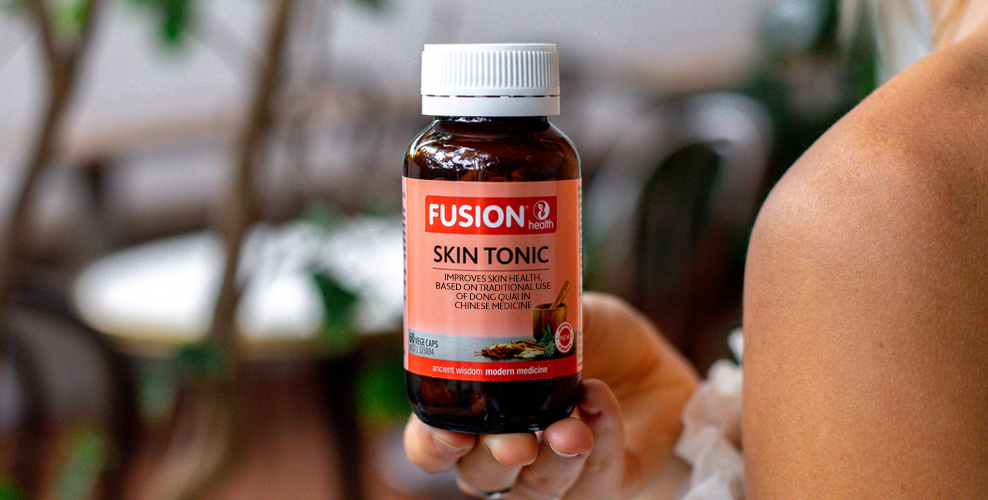Mild eczema: your questions answered
Sophia Power, BA Media

Did you know that in Australia, one in 12 adults experience eczema at some point?[1] If you suspect you have eczema, finding the root causes is just as important as finding a soothing topical solution. Discover some of the common causes and diet, lifestyle and herbal tips to get relief from this uncomfortable condition.
Quick overview on mild eczema
- Mild eczema is a dry and itchy skin condition, but there is hope for relief.
- Mild eczema triggers can include one or more foods, exposure to allergens in the environment, and even the personal care products you use.
- A whole food diet filled with antioxidant-rich fresh fruit and vegetables, along with healthy fats plays an important role in managing mild eczema. There’s even a handful of targeted herbs and nutrients that can help bring relief from the inside out.
Mild eczema: signs and symptoms
Mild eczema shows up as dry, itchy skin that can become red and even hot. Although it pops up in some ‘typical’ places like behind the knees and the crooks of the elbows, it really can appear just about anywhere on the body.[2]
Is eczema contagious?
Eczema is not contagious. The changes to the skin are not related to bacteria, viruses or fungi that are infectious.[3]
However, when there is damage to the skin barrier of any kind, there is a higher risk of infection. Ways you can minimise this include:
- Keeping the area/s clean.
- Always washing your hands before applying lotion (or to scratch if you must!).
- Cutting nails short to avoid transferring bacteria to eczema patches.
If the affected skin changes suddenly becomes crusty, oozy, more red or sore, see your GP immediately to rule out infection.
What causes mild eczema?
Some mild eczema sufferers experience it seasonally or cyclically. Either way, finding the cause/s of the eczema is the first step in treatment.
Drivers of mild eczema vary, so it can take time to pinpoint the cause. However, there are some typical environmental and dietary causes you may want to consider first.
Common food and lifestyle causes of mild eczema:[4,5]
- Harsh laundry detergent
- Common household cleaners and chemicals
- Soaps, body washes
- Synthetic fragrances
- Personal care products – makeup, perfume
- Dust, dust mites
- Mould
- Wool
- Pollen
- Animal dander (pet fur)
- Wheat
- Dairy
- Eggs
- Soy
Mild eczema vs. mild psoriasis and hives
Mild eczema can be difficult to identify and is sometimes mistaken for other skin conditions.
Psoriasis shows up as red, scaly patches of thickened skin. The difference is that psoriasis is more likely to show up on the palms of the hands, soles of the feet, the face, scalp, and back – as well as the knees and elbows.[6]
Hives is raised, red and can be itchy. The difference with hives is that it often resolves within a few hours or days.[7] If it flares up for longer or you’re not sure if it might be eczema, seek a professional diagnosis.
TOP TIP: if you have a family or personal history of eczema, asthma and/or allergies of any kind, you’re more likely to also be dealing with eczema.[5]
Mild eczema treatment diet
Mild eczema can be tricky to deal with, but luckily there’s a lot you can do to get relief. Patience, persistence and trying not to let it overwhelm you are key!
An elimination diet can be helpful in identifying foods which might be setting off your mild eczema.[2]
You might want to try identifying if any of these common dietary triggers are affecting you. In addition to wheat, dairy, eggs and soy mentioned above, the following can also be problematic:[4,8]
- Gluten
- Fish/shellfish
- Nuts
- Highly processed snack foods
- Trans-fats (found in margarine, processed foods, fast food)
- Refined sugar (found in cakes, chocolate, biscuits, soft drink)
Try eliminating one food at a time, for a minimum of three days, to see if your eczema symptoms settle.

Avoid histamines
Histamine is a chemical that is naturally produced by the body in small amounts.[9] An increase in histamine levels in the body can be triggered by an allergen, causing increased blood flow in the affected area, like the skin.[9] Some people with eczema also have a histamine intolerance that can contribute to symptoms such as itching.[10]
An anti-histamine diet rich in quercetin (a natural anti-histamine), can help to reduce histamine levels in the body. Foods high in quercetin include:[11]
- Apples
- Red onions
- Spring onions
- Leek
- Garlic
- Broccoli
- Kale
- Cabbage
Foods helpful for mild eczema
Include more essential fatty acids from healthy fats, antioxidants, vitamins, minerals and probiotics in your diet to support immunity and the health of skin cells.[8,12]
Sources of healthy fats:
- Avocado
- Nuts
- Chia and flaxseeds
- Olives and olive oil
- Oily fish – sardines, mackerel, salmon, trout
- Coconut oil
Antioxidant-rich foods:
- Ginger
- Turmeric
- Blueberries
- Green tea
- Red grapes
- Citrus fruits
Probiotic-containing foods:
- Miso paste
- Sauerkraut
- Pickled vegetables
- Unsweetened yoghurt
- Kefir
- Kombucha
- Kimchi
TOP TIP: Exclude probiotic-containing foods if trialling a low-histamine diet as these can contain increased levels of histamine.

Herbs for eczema relief
A number of herbs can also help provide relief from mild eczema. Fusion Skin Tonic contains Japanese catnip, traditionally used to relieve itchy skin and symptoms of mild eczema in Chinese medicine. Plus dong quai, used in traditional Chinese medicine (TCM) as a blood tonic to improve skin health by relieving dry skin and relieve mild allergy symptoms including hives.
Lifestyle tips for mild eczema
- Moderate doses of ultraviolet-B rays from sunshine can help to improve vitamin D production in the skin, which helps to support a stronger skin barrier.[13]
- Changing sheets regularly and using laundry detergent made for sensitive skin can also help. Bed sheets should ideally be washed once a week to remove common irritants such as dust, dust mites and animal dander.[14]
- Avoid water that is too hot. Regular hot showers will irritate and dry out the skin and can lead to worsening of mild eczema symptoms.
- Patch test new skincare products before use. Mild eczema is sensitive skin which may be easily irritated by new products, natural or synthetic.
- Steer clear of certain materials on skin such as wool and acrylic. Go for breathable, natural fibres such as linen, cotton, hemp cotton or bamboo.
- Try an oatmeal bath – don’t worry, it doesn’t mean clogging up your drain with porridge! Colloidal oatmeal is a finely ground, powdered form of oatmeal that has been shown to soothe itching and protect the skin.[15]
- Find a cream that soothes and hydrates your skin and stick with it! Keeping the skin hydrated is an important part of topical treatment for mild eczema, so find something without fragrances that agrees with your skin and use it daily.
- Stress management is an important part of alleviating mild eczema. Not only does stress contribute to developing eczema, eczema itself can be a stressful condition! Some ideas to help manage your stress levels include qigong, ocean swimming, deep belly breathing, meditation and yoga

Taking a holistic approach from finding the causes to managing mild eczema symptoms might make all the difference, with dietary to lifestyle changes, and throwing some helpful herbs in the mix, too.
Always read the label and follow the directions for use.
References:
- Eczema. Accessed August 2021 from https://www.eczema.org.au/adults-who-have-eczema/
- Hechtman, L. Clinical Naturopathic Medicine 2nd Ed 2019. Chatswood, NSW: Churchill Livingstone Elsevier.
- Healthline. Updated August 2018, Accessed August 2021 from https://www.healthline.com/health/is-eczema-contagious#takeaway
- WedMD. Reviewed August 2020, accessed August 2021 from https://www.webmd.com/skin-problems-and-treatments/eczema/ss/slideshow-top-eczema-triggers#:~:text=Peanuts%2C%20milk%2C%20soy%2C%20wheat,think%20might%20cause%20eczema%20flares
- ASCIA. Reviewed 2019, accessed August 2021 from https://www.allergy.org.au/patients/skin-allergy/eczema
- WebMD. Reviewed October, 2020, accessed August 2021 from https://www.webmd.com/skin-problems-and-treatments/psoriasis/psoriasis-or-eczema
- Healthline. Reviewed June 2021, accessed August 2021 from https://www.healthline.com/health/eczema-vs-hives#hives
- Healthline. Updated September 2018, accessed August 2021 from https://www.healthline.com/health/skin-disorders/eczema-diet#dyshidrotic-and-elimination-diets
- WebMD. Reviewed June 2020, accessed August 2021 from https://www.webmd.com/allergies/what-are-histamines
- Darwin dieticians. Accessed August 2021 from https://www.darwindietitians.com.au/do-you-get-flare-ups-of-eczema-it-could-be-a-histamine-intolerance/
- Healthline. Updated January 2020, accessed August 2021 from https://www.healthline.com/health/low-histamine-diet
- MindBodyGreen. Accessed August 2021 from https://www.mindbodygreen.com/articles/quercetin-foods
- Hong SP, et al. J Invest Dermatol 2008;128(12):2880-2887.
- National Sleep Foundation. Updated October 2020, accessed August 2021 from https://www.sleepfoundation.org/bedding-information/how-often-should-you-wash-your-sheets
- Healthline. Reviewed April 2018, accessed August 2021 from https://www.healthline.com/health/oatmeal-bath-for-eczema#bath-preparation




















